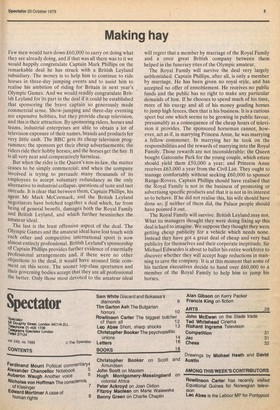Making hay
Few men would turn down £60,000 to carry on doing what they are already doing, and if that was all there was to it we would happily congratulate Captain Mark Phillips on the remarkable deal he has struck with a British Leyland subsidiary. The money is to help him to continue to ride horses in three-day jumping events and to assist him to realise his ambition of riding for Britain in next year's Olympic Games. And we would readily congratulate British Leyland for its part in the deal if it could be established that sponsoring the brave captain so generously made commercial sense. Show-jumping and three-day eventing are expensive hobbies, but they provide cheap television, and this is their attraction. By sponsoring riders, horses and teams, industrial enterprises are able to obtain a lot of television exposure of their names, brands and products for very little cash. The BBC gets its cheap television programmes; the sponsors get their cheap advertisements; the riders ride their hobby horses; and the horses get the hay. It is all very neat and comparatively harmless.
But when the rider is the Queen's son-in-law, the matter ceases to be simply commercial; and when the company involved is trying to persuade many thousands of its employees to accept voluntary redundancy as the only alternative to industrial collapse, questions of taste and tact obtrude. It is clear that between them, Captain Phillips, his agent Mr Mark McCormack, and the British Leyland negotiators have botched together a deal which, far from being of general benefit, damages both the Royal Family and British Leyland, and which further besmirches the amateur ideal.
The last is the least offensive aspect of the deal. The Olympic Games and the amateur ideal have lost touch with each other and competitive international sport is now almost entirely professional. British Leyland's sponsorship of Captain Phillips provides further evidence of essentially Professional arrangements and, if there were no other Objections to the deal, it would have aroused little comment on this score. The sooner top-class sportsmen and their governing bodies accept that they are all professional the better. Only those most devoted to the amateur ideal will regret that a member by marriage of the Royal Family and a once great British company between them helped in the funerary rites of the Olympic amateur.
The Royal Family will survive the deal very largely unblemished. Captain Phillips, after all, is only a member by marriage. He has been given no royal style, and hasaccepted no offer of ennoblement. He receives no public funds and the public has no right to make any particular demands of him. If he chooses to spend much of his time, more of his energy and all of his money goading horses to jump high fences, then that is his business. It is a curious sport but one which seems to be growing in public favour, presumably as a consequence of the cheap hours of television it provides. The sponsored horseman cannot, however, act as if, in marrying Princess Anne, he was marrying a fellow commoner. In marrying her he took on the responsibilities and the rewards of marrying into the Royal Family. Those rewards are not inconsiderable: the Queen bought Gatcombe Park for the young couple, which estate should yield them £50,000 a year; and Princess Anne receives £63,000 a year from the Civil List. They ought to manage comfortably without seeking £60,000 to sponsor Range-Rovers. Captain Phillips should have realised that the Royal Family is not in the business of promoting or advertising specific products and that it is not in its interest so to behave. If he did not realise this, his wife should have done so; if neither of them did, the Palace people should have pointed it out.
The Royal Family will survive. British Leyland may not. What its managers thought they were doing fixing up this deal is hard to imagine. We suppose they thought they were getting cheap publicity for a vehicle which needs none. Instead they have got a great deal of cheap and very bad publicity for themselves and their corporate ineptitude. Sir Michael Edwardes is about to ballot his entire workforce to discover whether they will accept huge reductions in manning to save the company. It is at this moment that some of his tactless executives decide to hand over £60,000 to a Member of the Royal Family to help him to jump his horses.






































 Previous page
Previous page